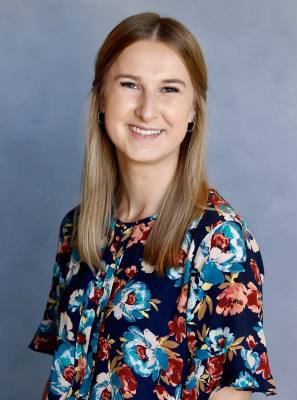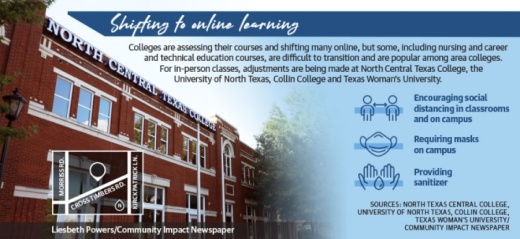Local colleges such as North Central Texas College, the University of North Texas, Texas Woman’s University and Collin College have worked to recreate higher education for the upcoming fall semester with new learning options and additional safety measures.
Input from the Texas Higher Education Coordinating Board has allowed for flexibility in the rules and regulations institutions have decided to adopt.
“The plans for [returning to campus] are based upon what the current [COVID-19] data is showing,” said Ray Martinez, deputy commissioner for academic a airs and workforce education with the Texas Higher Education Coordinating Board.
Anticipating enrollment
At the most basic level, colleges are still unsure of how many students they will have in the fall.
Not knowing final fall enrollment numbers during the summer is typical, local colleges say, but some, like North Central Texas College, are prepared for a 12%-15% decrease in total enrollment.
“During normal times of economic recessions, we tend to see community college enrollment rise, but this is not a normal time of recession, so we’re preparing for a decrease in enrollment,” NCTC Media Specialist Elizabeth Abu shared via email.
Some recent Lewisville ISD graduates may be taking a closer look at local community colleges, said Jill Adams, the LISD director of counseling and social work services.
Based on parent and student interactions, a number of students are thinking twice about enrollment at a four-year school as well as at those schools far from home, she said.
“A lot has changed over the summer,” Adams said. “I think that the shift to community college has to do with finances and safety.”
An April study by SimpsonScarborough of roughly 1,000 students across the nation recommended that fouryear institutions prepare for a 10% decline in first-time, full-time students. A similar national poll by Art & Science Group LLC found that one in every six of roughly 500 surveyed college-bound high school seniors were close to giving up on attending a four-year college or university as a full-time student.
University of North Texas, Texas Woman’s University, NCTC and Collin College have been among the top choices for LISD graduates in Texas in recent years. Representatives from those schools said they have not seen a signi ficant change in enrollment so far.
Students have until late August and September to make their final decisions, but major changes are not anticipated, according to leadership from UNT, TWU and Collin College.
A new way of learning
Students who have classes at UNT, TWU, NCTC and Collin College will have online and in-person learning options, but each college is approaching learning a little di fferently.
At NCTC, roughly 80% of classes have been moved fully online. The remaining classes are ones that were di fficult to transition online, such as the lab portions of courses at the Flower Mound campus, said Jessica DeRoche, the college’s senior director. Those classes have options for synchronous online, or streamed, courses; traditional, in-person courses; and hybrid learning, where some of the class is online and some is in person, she said.
Collin College, TWU and UNT expect to o ffer online, hybrid and in-person courses this fall as well. Roughly 25%-30% of Collin College’s course offerings will be fully online,according to the college, nearly doubling the percentage of online o fferings from 2019. Enrollment for online courses has also grown signi ficantly, said Toni Jenkins, senior vice president of campus operations.
At the same time, about a third of UNT students are choosing a fully online schedule in the fall, Provost Jennifer Cowley said. Roughly 13% of UNT’s courses were online in 2019.
UNT has also started a new program that aims to combat any isolation or health issues that freshmen may face in starting the year partially or fully online, Cowley said.
Because of the technical nature of many of TWU’s key studies, including occupational therapy, nursing, dental hygiene and other allied health professions, the college is still o ffering a large number of its courses in person, Vice President for Student Life Monica Mendez- Grant said.
The college will also be targeting first- and second-year core courses for in-person learning in order to help incoming students form communities, she said. However, so far, more students have chosen to enroll in online courses when given the choice, according to the college.
This fall, masks will be required on campus at UNT, TWU, NCTC and Collin College, and in-person classrooms will follow some distancing protocols, leaders from each institution said.
Additionally, all students at UNT will shift to online learning after Thanksgiving to limit viral spread from traveling.
Aiding students
Student financial need has grown over the course of the pandemic, and colleges have risen to meet that need, institutional officials said.
Colleges worked quickly to distribute Coronavirus Aid, Relief, and Economic Security Act funds throughout the spring and summer: NCTC offered roughly $2 million in grants, and Collin College had distributed close to $5 million in grants as of July.
Campuses are also prepared to assist students with altered financial situations from when they applied to the Free Application for Federal Student Aid. There is a structured process for these FAFSA changes, and UNT expects to have increased student need for these processes in the fall, Cowley said.
The number and amount of scholarships given will be upheld in the coming year or increased, college o fficials stated. Applications for additional emergency funds are also available for students at each of the four North Texas colleges.
TWU is prioritizing its retention of student employees in the fall, shifting some student assistants and workstudy students into roles with the financial aid department.
As the pandemic presses on into the fall, colleges are doing their best to be prepared and to provide for their students and families, leadership shared.
“We [are trying] to be as flexible as we can to support our students,” Cowley said.
Elizabeth Uclés and Miranda Jaimes contributed to this report.







